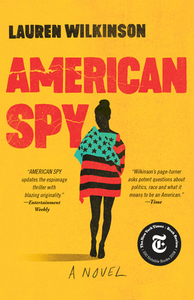You need to sign in or sign up before continuing.
Take a photo of a barcode or cover
adventurous
dark
fast-paced
Plot or Character Driven:
A mix
Strong character development:
Yes
Loveable characters:
No
Diverse cast of characters:
Yes
Flaws of characters a main focus:
Yes
Not what I had expected from something appearing to be soy fiction, but the mismatched expectations helped the fiction overall, I think. I’m not sure if it’s intentionally subversive. Ideologically it certainly seems to be when compared to a typical spy/thriller style book.
The book is written as though the main character is leaving the story of her life for her young children, jumping back and forth from her young life to more current events, and why she is leaving her children in the first place and leaving her story behind.
It’s a fairly slow story with not much action. But it was interesting throughout. The most interesting part was her perspective in the FBI/ CIA/ American ideologies, in general—especially as it is executed abroad.
The book is written as though the main character is leaving the story of her life for her young children, jumping back and forth from her young life to more current events, and why she is leaving her children in the first place and leaving her story behind.
It’s a fairly slow story with not much action. But it was interesting throughout. The most interesting part was her perspective in the FBI/ CIA/ American ideologies, in general—especially as it is executed abroad.
'American Spy' begins with one of the best opening paragraphs I've ever read:
"I unlocked the safe beneath my desk, grabbed my old service automatic, and crept toward my bedroom doorway, stealthy until I was brought to grief by a Lego Duplo that stung the sole of my foot. I hobbled the rest of the way to the door and crouched behind it."
After reading that, I thought I was in for a rip-roaring spy thriller with a fun twist. I was mistaken. I got, instead, the elegaic memoir of a fictional spy, written to her children before embarking on what may be her last mission. It's a memoir steeped in questions of race, gender, ideology, and identity. It's occasionally exciting, but the format does a disservice to the genre - always holding a filter up between the reader and the action. This leads the reader to believe that the author is more interested in pursuing the questions that haunt her than, y'know, entertaining an audience.
In other words, 'American Spy' reads like it was written for the staff of the New York Times Book Review, a staff which would deign to read a spy novel only if it were sufficiently literary to be dull. Worse, it's a tease: setting up a huge, novel-spanning conflict it never pays off. I know, I know: one could remove one's pipe from one's mouth long enough to argue that the actual conflict of the novel isn't the one that triggers the inciting incident. But screw that. If you're going to write in a genre, then respect the rules of that genre. Otherwise, you're just a dabbler, using that genre to score points while remaining safely above it.
Recommended for: I dunno. Hippies, maybe.
"I unlocked the safe beneath my desk, grabbed my old service automatic, and crept toward my bedroom doorway, stealthy until I was brought to grief by a Lego Duplo that stung the sole of my foot. I hobbled the rest of the way to the door and crouched behind it."
After reading that, I thought I was in for a rip-roaring spy thriller with a fun twist. I was mistaken. I got, instead, the elegaic memoir of a fictional spy, written to her children before embarking on what may be her last mission. It's a memoir steeped in questions of race, gender, ideology, and identity. It's occasionally exciting, but the format does a disservice to the genre - always holding a filter up between the reader and the action. This leads the reader to believe that the author is more interested in pursuing the questions that haunt her than, y'know, entertaining an audience.
In other words, 'American Spy' reads like it was written for the staff of the New York Times Book Review, a staff which would deign to read a spy novel only if it were sufficiently literary to be dull. Worse, it's a tease: setting up a huge, novel-spanning conflict it never pays off. I know, I know: one could remove one's pipe from one's mouth long enough to argue that the actual conflict of the novel isn't the one that triggers the inciting incident. But screw that. If you're going to write in a genre, then respect the rules of that genre. Otherwise, you're just a dabbler, using that genre to score points while remaining safely above it.
Recommended for: I dunno. Hippies, maybe.
From the first page, Lauren Wilkinson had me hooked. Her writing is beautiful in its simplicity and function. This story about a black woman immersed in the annals of the FBI and CIA involvement in Africa in the late 1980s grapples with issues of identity and power packed into an imminently interesting plot.
One might balk at the idea that a reader could find much in common with a CIA operative on a personal level. Wilkinson, through the wise choice of structuring the book as a journal-read-letter, invites us into the murkiness that characterizes the constant integration of the way we see ourselves, the way we want to see ourselves, the way we *have* to see ourselves, and the way others see us. Really, you get all of that in this superb novel.
When I finished, I thought about how much longer this novel *could* have been and how much I appreciated the author's brevity; the story and its narration really engage the reader to assemble all of the details it leaves out into the semblance of a journey. Other than Marie and her sister (a character I fawned over at every turn), we see relatively little of all the other characters though have a relatively strong sense of who they are and how they exist in the world Wilkinson creates.
More, Lauren Wilkinson, more!
One might balk at the idea that a reader could find much in common with a CIA operative on a personal level. Wilkinson, through the wise choice of structuring the book as a journal-read-letter, invites us into the murkiness that characterizes the constant integration of the way we see ourselves, the way we want to see ourselves, the way we *have* to see ourselves, and the way others see us. Really, you get all of that in this superb novel.
When I finished, I thought about how much longer this novel *could* have been and how much I appreciated the author's brevity; the story and its narration really engage the reader to assemble all of the details it leaves out into the semblance of a journey. Other than Marie and her sister (a character I fawned over at every turn), we see relatively little of all the other characters though have a relatively strong sense of who they are and how they exist in the world Wilkinson creates.
More, Lauren Wilkinson, more!
medium-paced
Plot or Character Driven:
Character
Strong character development:
Complicated
Loveable characters:
Complicated
Diverse cast of characters:
Complicated
medium-paced
Plot or Character Driven:
A mix
Strong character development:
Complicated
Diverse cast of characters:
Yes
Flaws of characters a main focus:
Yes
I am writing this review because I want to offset the negative ones. I listened to the audiobook and while it is written as journal entries and it’s not ALL action, this is a spy novel about a military coup that really happened. The politics behind it, the characters and the push/pull were well written and I found most of the book to be a page turner.
informative
reflective
medium-paced
Plot or Character Driven:
A mix
Strong character development:
No
Loveable characters:
Yes
Diverse cast of characters:
Yes
Flaws of characters a main focus:
No
I liked this book and looked forward to picking it up when I got the chance. It's iteresting and a good story but I can't really say anything particularly stood out except perhaps the way the narrator tells the story. That's refreshing. It's a nice read





